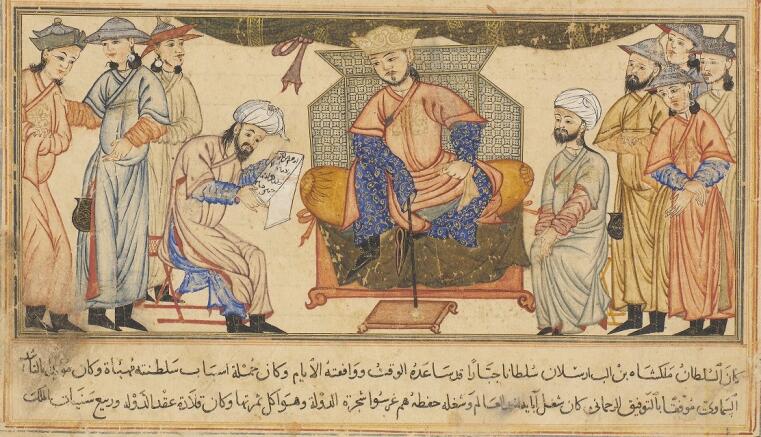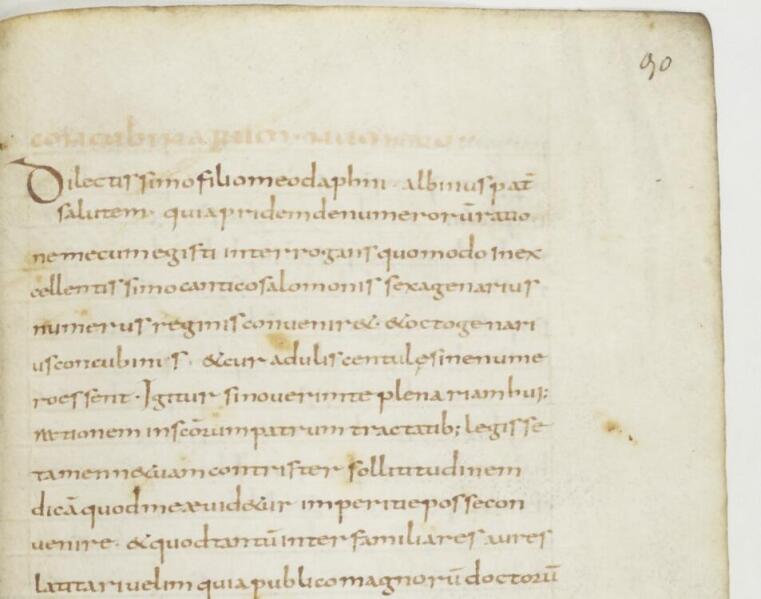„The Carolingian state-church relationship involved rivalry with the Greeks“
Comparing political advice literature reveals relations between East and West – Interview with Sophia Mösch

Once born, ideas tend to spread very quickly. Nowadays, we can find out in real time what people on the other side of the world are talking about. While the Middle Ages may have been far from such speeds, cultural spheres even at that time were by no means self-contained. In fact, there was a lively exchange of knowledge, ideas, and texts. In studying political advice literature for rulers in Europe and the Middle East, the historian Sophia Mösch is embarking on an exciting philological search for clues: it is only a meticulous comparison of texts that can lay bare the linguistic and thematic links between the Latin, Greek, Persian and Arabic sources. Despite all the differences, what becomes apparent is that political thought in East and West was probably more closely interrelated than previously assumed.
Dr Mösch, you examine mirrors for princes and political advice literature for rulers between the 9th and 11th centuries comparing the Carolingian, Macedonian and Seljuk dynasties. Why these three in particular?
Alcuin of York and Nizam al-Mulk’s engagement with different states of social order that call for different sovereign virtues suggests that there are links between Western and Eastern political advice texts both at the level of content and language. So far, no in-depth study has established intertextual connections between Carolingian, Macedonian and Seljuk political advice. My monograph explores mirrors for princes as analytical frameworks and culturally reflective tools in the transmission of texts and ideas. Dynasty (δυναστεία) is an ethnic analytical category denoting “lordship”, which can be innovative in so far as it is subject neither to temporal nor spatial parameters.
The ninth, tenth and eleventh centuries were formative: in Western and Eastern Europe, the minuscule was developed, and classical, biblical and patristic texts were copied and arranged in florilegia to nurture the dissemination of knowledge. The scholarship on Carolingian mirror works is richer than that on ninth-/tenth-century Greek political advice texts. However, in view of the fact that the developing Carolingian state-church relationship involved political and religious controversy and rivalry with the Greeks, it may be argued that Western European source analyses have been one-sided, and that Carolingian specialists in search of new findings also need to look “at the carpet from the wrong side”.
Under Malik-Shah I (1072-1092), whose ethnically inclusive policies may be compared to those with Charlemagne, the Seljuk dynasty experienced a period of military and economic recovery, as well as governmental and cultural transformation. While seeing the fracture and coalescence of Persian cultural structures as a result of tensions between established ideas of Islamic policy and Perso-Turkish notions that were gradually penetrating the body politic of the Caliphate, it was not least due to Nizam al-Mulk’s political advice that Malik-Shah I’s reign hosted a series of reforms. Most important among these were the organisation of a system of education and the setting up of education institutions. That more transcultural and comparative research is needed is highlighted by Linda T. Darling who observes in her study on European and Middle Eastern mirrors for princes: “Europeans wrote ‘some thousand’ Mirrors and works of political thought and advice in both the medieval and early modern eras, and the volume of scholarship on them is immense compared to that on Middle Eastern Mirrors. But rarely if ever have comparisons of these traditions across the East-West boundary been made.” Another scholar of Islam, Neguin Yavari, notes that Western-language studies on Seljuk political advice and policies are lacking.
In the same vein, due to the marginalisation of the Greek empire in the study of medieval Europe, Byzantinists are lagging behind in practical and dynamic approaches to power and politics. Much can be learned from the new methodologies pioneered by Janet L. Nelson among scholarship on the Latin West. Margaret Mullett, for example, drew on Dimiter Angelov and Paul Magdalino and criticised the Byzantinists’ conservative approaches to sources such as epideictic oratory.
My monograph relates mirrors for princes to this newer research on societies and prompts more dynamic questions such as how political advice happened as a process.
„Mirrors for princes can serve as interdisciplinary analytical frameworks“
What are the particularities of working with Latin, Greek and Arabic/Persian sources?
Among the Latin, Greek and Persian/Arabic sources that provide instruction, my research examines texts that reflect the interplay between political, legal and religious authority. These include treatises of moral instruction and so-called ‘mirrors for princes’. Forming part of the genre of ‘mirror’ literature – which in itself represents a reflection – mirrors for princes convey a culture-specific image. In this way they can serve as interdisciplinary analytical frameworks and culturally reflective tools in studying the transmission of texts and ideas.
The Persian mirror for princes has its origins in pre-Islamic genres referred to as “book” (nāmag in Middle Persian; nāme or نامه in New Persian) such as the Ewen-Nāmag (“Book of Rules”) on the Sasanian customs and manners. In Islamic texts, “book” (nāme or نامه) is retained in the Ottoman Turkish tradition, where the Naṣīḥat-nāme or نصيحت نامه denotes an “advice letter” addressed to a sultan. In Arabic titles, the words naṣīḥat or نصيحت (“advice”/”counsel”) and siyar سیر (“manners”) feature frequently in combination with al-mulûk or الملوك (“of kings”), and kitāb or کتاب replaces nāme or نامه for “book”. The Greek texts that give advice to newly crowned emperors are titled παραίνεσις, παραινετικὰ κεφάλαια, λόγος νουθετητικός, ὑποθῆκαι and βασιλικὸς ἀνδριάς or are labelled περὶ βασιλείας in the Greek manuscript tradition. In the Latin West, the literal term “mirror of/for kings” (speculum regum) appears relatively late: for the first time, in the title of Godfrey of Viterbo’s genealogy of kings in 1183. The speculum genre, in general, refers to instructive works that function as manuals.

You are particularly interested in strategies of legitimising power. What differences can you identify? And what role do legal or religious arguments play in each case?
Political advisers were involved in legitimising power and propagating reforms under the examined dynasties. Some advisers were religious authorities, others laymen or jurists. Their culture of advice, interchange, and their engagement with sources, I argue, are representative of the ‘elites’ who provided moral instruction. An important contribution of my study is to expose cultural differences in the composition of these actors – treated in an oversimplified manner as ‘elites’ in all three research traditions – who held the highest social status under Carolingian, Macedonian and Seljuk rule and who defined the dynamics between political-religious authority and the involved legal structures.
To give an example, unlike the Carolingian succession to the throne, the Macedonian succession did not function on the basis of inheritance by blood-right and divinely approved male authority alone. Skills such as military strength, popularity among the people (demes) and good relations with the church played an important role. Consequently, the legitimacy to power could be lost, and, more importantly, also women could ascend the throne (in particular, if the male heir was too young to rule) – albeit only with a status comparable to modern “minority”. In these cases, a power vacuum was often filled by other members of the ‘elites’, such as eunuchs and ecclesiastics.
Under the Carolingians, a combination of the Germanic notion of kinship and Roman notion of separation of person and office, which meant the recognition of the male holder of the title without regard for his personal qualities, defined the law of succession. In the Carolingian ninth century, the episcopate gained an extraordinary political influence through unique networks of consensus (which are visible, for example, in letter exchanges such as those by Archbishop Hincmar of Rheims), and Carolingian noblewomen were married off to counts in the peripheries in order to strengthen the empire (for example, Dhuoda).
Under Malik-Shah I, the Seljuk succession was challenged when two of his eldest sons, born to the Kara-Khanid Princess Terken Khatun, died. Terken Khatun had a third son whom she wanted to succeed to the sultanate, while Nizam al-Mulk and the army of the Seljuks preferred a son who was the oldest living son and was of Seljuk descent. In an unsuccessful attempt to remove Nizam al-Mulk from office, the princess allied with a Seljuk courtier who then accused Nizam al-Mulk of corruption before Malik-Shah I.
Thus, whether there were existing power vacua that could be exploited by players of the so-called ‘elites’, was in all three cultural systems – although in different ways – also a question of gender and age.
You are also concerned with identifying relationships between the texts and tracing the flow of ideas between East and West. How do you proceed methodologically? Are there digital tools that help you and if so, how important do you consider them for your work?
The method I apply to the sources is philological-historical and is inspired by Erich Auerbach (who anticipated Quentin Skinner). It considers the Latin, Greek and Persian/Arabic texts as political discourses defined by content and language. Erich Auerbach collected thematically related texts, examining them for recurrent content and language. He searched for elements in the sources that are worth investigating because they help explain coherences between texts. Analysing these elements with regard to the contexts in which they occurred enabled him to define them. Thus, he came closer to understanding the meaning of the texts in the historical contexts under investigation.
Such an approach compels the researcher to establish early in their work what can be identified as being characteristic within the sources; and it does not impose external theoretical frameworks on the texts but looks for what is characteristic in the material itself. My selection of passages from Carolingian, Macedonian and Seljuk political advice involves reading for meaning (ideas of political thought), terminology, concepts and figures, rhetoric and style. The approach to the Latin, Greek and Persian/Arabic sources is twofold and requires looking for explicit and implicit relations between texts. To locate these relations, I rely on analogue and (where available) digital word-search techniques and tools. For example, I use the advanced linguistic text and word search of the Electronic Monumenta Germaniae Historica, as well as the Patrologia Latina and Patrologia Graeca online search tools. These digital tools work particularly well for languages without diacritics (i.e. Latin). In addition, I use manuscript evidence. The aim is to point out relations between the sources at various levels of the texts.
Applied to a Latin-Greek-Persian/Arabic transcultural context, my method is intended to foster debate on methodologies in the wider study of political advice and enable the investigation to reach beyond national and disciplinary research traditions: the enquiry into the language of governance in Latin, Greek and Persian/Arabic sources contributes towards an understanding of foreign terms used within research on ideas of rulership; the examination of the institutional relationship between political, religious and legal spheres extends beyond the discipline of History.
Are there passages in the works you have studied in which you can unequivocally identify intertextual connections?
Yes. I think I found similarities – it seems not just in political thought but also at the textual level – between passages from Alcuin of York’s Epistolae and Nizam al-Mulk’s سياست نامه (“Book of Government”).
Like Alcuin, Nizam al-Mulk plays with contrasts between opposing states of social order that call for opposing sovereign virtues. A phase of disorder and discord demands the ruler’s “power” against the enemies of the state; a phase of order and peace demands “wisdom”, which allows for more refined political decision-making and a religious judgment. The succession of these phases represents a progress towards a society guided by divine principles. An important attribute by which this final state is achieved is “justice”. A detailed philological analysis of these sources in their original languages will reveal how exactly Alcuin’s spiritual idea of “justice” and the “circle of justice” invoked by Nizam al-Mulk come into play in this process.

“Western scholars excluded the Eastern empire from the study of medieval Europe”
Recently, doubts have been expressed from a global historical perspective about the appropriateness of the periodisation "Middle Ages". What is your opinion on this in the light of your research on the cultural transfer between East and West?
Western scholars such as Mayke De Jong, Anthony Kaldellis and, above all, Janet L. Nelson have highlighted that the field of Medieval Studies is shaped by European scholarship that emerged during the 1930s. Not only Islamic Studies, but Byzantine Studies too, were marginalised. The Western perspective, drawn to absolute power and theocratic ideas, fostered a range of abstract stereotypical formulae with reference to the Eastern empire (“the absolutist Orthodox Christian empire”, “the Empire of the Greeks” and “Byzantium”): conferring notions of ‘absolutism’, ‘theocracy’, spiritualism’, ‘orientalism’ and even ‘exoticism’ on the empire that marks the continuation of Rome in the East, Western scholars deprived the East of its Roman legacy and excluded the Eastern empire from the study of medieval Europe. It is only for convenience that I resort to ‘Byzantium’ with reference to the Eastern empire, in contrast to the ‘Carolingian empire’ designating the Frankish attempt to revive the Western Roman tradition.
The historian of Abrahamic Faiths Garth Fowden observes that the two twentieth-century European pioneers who first considered Islam as part of the European historical narrative are Carl H. Becker (1876-1933), the German co-founder of modern Islamic Studies, orientalist and politician during the Weimar Republic, and Henri Pirenne (1862-1935), the Belgian medievalist known for the so-called Pirenne Thesis concerning the origins of the Middle Ages in reactive state formation and shifts in trade. According to Becker and Pirenne, Europe included Islam, but their interests did not go beyond establishing a genealogy of Europe. After WWII, the eminent historian Peter Brown developed a synthesis, pursuing historical continuities up to 800 AD. His time frame, however, treated Islam as a mere extension of Late Antiquity.
Personally, I find it important that Western academics engage in dialogue with Muslim scholarship. According to Jaakko Hämeen-Anttila, a professor of the Arabic language and Islamic Studies at the University of Edinburgh, references to Western analytical categories in Muslim Islamic Studies are relatively rare, since scholars can bypass periodisations such as Late Antiquity and the Middle Ages if their research is not culturally comparative. The gulf between Western/non-Muslim Islamic Studies and Muslim Islamic Studies (which Garth Fowden describes as a “parallel tradition”) is much wider than Garth Fowden assumes. There remains the question of the role traditional analytical categories should play in research that addresses intercultural and interreligious issues. Since pressures to conform to Latin, Greek or Islamic perspectives weigh heavily on philologists, it is the task of historians to give shape to innovative and culturally inclusive analytical frameworks.
In my monograph, I explicitly work with the term ‘transcultural’, in the sense of research that is not specific to one culture but that transcends cultural borders. By ‘transcultural’ I do not mean ‘transreligious’ or ‘transethnical’. My project takes a philological-historical approach, and I therefore mean ‘transcultural’ first and foremost in philological terms. Likewise, I understand the terms ‘West’ and ‘East’ mainly philologically, i.e. as the Latin West and the Greek and Persian/Arabic East. On the other hand, I believe the term ‘international’, for example, would not work well to frame my research, since it does not necessarily involve different cultural systems. Furthermore, I think that the term ‘global’ is in most of its applications – including in the notions of ‘globalisation’ and the ‘Global Middle Ages’ – too ambitious. A competing title to my forthcoming (2023) interdisciplinary workshop and edited collection is Global Medieval: Mirrors for Princes Reconsidered (Regula Forster & Neguin Yavari eds., Boston, Massachusetts 2015). In response to this volume, I argue that situation-specific comparisons are asked for if we want to foster a more global understanding of concepts of political thought: for example, “jihad” and how this concept was fundamentally misinterpreted by the German orientalist and politician Carl H. Becker during the lead-up to WW1. As Garth Fowden has pointed out, politically, Becker encouraged the Kaiser’s cultivation of an Ottoman-German alliance and, once war broke out, backed the proposal that the Ottoman Empire declare “jihad” against the Entente powers. However, Becker made the fundamental mistake of not recognising “jihad’s” context-related meaning or its limitedness to particular context.
Last but not least: What makes working at the Käte Hamburger Kolleg special for you?
I think that my interdisciplinary and multilingual academic profile can contribute towards synthesis building within the Käte Hamburger-Kolleg – which is an area in which my leadership interests as a researcher lie. Working as a research associate for the Kolleg also gives me the opportunity to link my innovative intercultural project with a larger international academic network of historical scope and current relevance. It gives me the chance to share my UK network of scholars with relevant researchers in Münster and, in turn, expand my own network to include German specialists in my field.
As a medievalist studying the transmission of texts and ideas, I am particularly keen on rethinking the meanings associated with ‘canonisation’, ‘translation’, ‘communication’ and ‘performance’. These are aspects that are also interesting for legal historians who are concerned with how law and jurisdiction happened as processes. In our last Reading Session, which I organise, we explored a text by Lauren Benton and Richard J. Ross on law within empires (2013). Since ‘statehood’ – in less Eurocentric terms, ‘community-building’ – is intrinsically linked with the creation of ‘rights’ and ‘laws’ for the state’s citizens, this text offers a particular lens through which the workings of law can be compared across cultures, without needing to have recourse to Western chronological or geographical categories such as periodisation. Being involved in forging suitable methods for studying processes in the unification and pluralisation of law means inventing a common ‘language’ that can be applied to various research contexts.
The questions were posed by Lennart Pieper.

